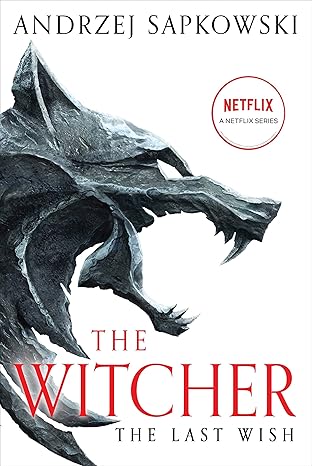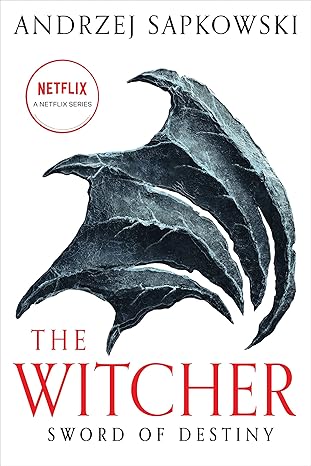
How to Read Andrzej Sapkowski's Books on What book is the Netflix series based on
How to Read Andrzej Sapkowski's Books on What Book is the Netflix Series Based On
Estimated Reading Time: 10-12 minutes
Introduction
Andrzej Sapkowski, a Polish author born in 1948, is best known for his fantasy series, "The Witcher," which has captivated audiences worldwide. His works, particularly "The Last Wish" and "Sword of Destiny," serve as the foundation for Netflix's popular adaptation, "The Witcher." Sapkowski's unique blend of Slavic mythology, moral ambiguity, and deep character development offers a rich tapestry that resonates with both fantasy enthusiasts and those seeking philosophical depth.
Sapkowski's perspective on heroism, morality, and the complexities of human nature is not only entertaining but also thought-provoking. His stories challenge traditional notions of good and evil, presenting characters who navigate a world filled with shades of gray. This complexity is especially relevant in today's cultural landscape, where moral dilemmas are prevalent. Understanding Sapkowski's work is essential for anyone looking to appreciate the intricacies of the Netflix series and the themes it explores.
Why Andrzej Sapkowski's Perspective Matters
Sapkowski's approach to storytelling is distinctive for several reasons. First, he draws heavily from Eastern European folklore, infusing his narratives with cultural richness that sets them apart from typical Western fantasy. His characters are not mere archetypes; they are deeply flawed and relatable, reflecting the complexities of real human emotions and decisions.
Moreover, Sapkowski's exploration of moral ambiguity challenges readers to reconsider their perceptions of heroism and villainy. Unlike many fantasy authors who present clear-cut battles between good and evil, Sapkowski's characters often grapple with their motivations and the consequences of their actions. This nuanced perspective encourages readers to engage with the text on a deeper level, fostering critical thinking about ethics and morality.
The lasting impact of Sapkowski's ideas is evident in the way they resonate with contemporary issues, making his works not just relevant but essential reading for those seeking insight into the human condition.
Overview of Recommended Books
The Last Wish
"The Last Wish" is a collection of interconnected short stories that introduces readers to Geralt of Rivia, a monster hunter navigating a world filled with magic, political intrigue, and moral quandaries. The book is not only an introduction to Geralt's adventures but also a profound exploration of fate, love, and the nature of humanity.
Main Themes and Arguments
- Fate vs. Free Will: The stories often grapple with the tension between destiny and personal choice, as characters confront the consequences of their decisions.
- Moral Ambiguity: Geralt embodies the struggle of making ethical choices in a world where right and wrong are often indistinguishable.
- The Nature of Humanity: Through encounters with various creatures and characters, Sapkowski examines what it means to be human, often highlighting the monstrous aspects of humanity itself.
Historical Context and Significance
Published in 1993, "The Last Wish" emerged during a time when fantasy literature was dominated by Western narratives. Sapkowski's incorporation of Slavic mythology and folklore not only broadened the genre's scope but also introduced readers to a rich cultural heritage often overlooked in mainstream fantasy.
Key Insights and Takeaways
- Embrace Complexity: The stories encourage readers to embrace the complexities of life and the moral dilemmas that come with it.
- Question Norms: Sapkowski challenges traditional notions of heroism, prompting readers to question societal norms regarding good and evil.
- Value of Choice: The importance of personal agency is a recurring theme, reminding readers that their choices shape their destinies.
Why Read This Book: "The Last Wish" is essential for understanding the Netflix series as it lays the groundwork for Geralt's character and the moral landscape he navigates. Fans of fantasy, ethics, and character-driven narratives will find much to appreciate in this collection.
Sword of Destiny
"Sword of Destiny," the second collection in the "Witcher" series, continues Geralt's journey and delves deeper into themes of love, loss, and the consequences of one's actions. This book is pivotal in establishing the relationships that shape Geralt's identity and moral compass.
Main Themes and Arguments
- Love and Sacrifice: The stories explore the complexities of love, particularly Geralt's relationship with Yennefer, highlighting the sacrifices made for those we care about.
- The Burden of Destiny: Characters grapple with their fates, often facing the harsh realities of their choices and the impact on those around them.
- Cultural Identity: The narratives reflect on the nature of belonging and the conflicts arising from cultural differences.
Historical Context and Significance
Published in 1992, "Sword of Destiny" further solidified Sapkowski's reputation as a leading voice in fantasy literature. The stories reflect the socio-political landscape of post-communist Poland, where themes of identity and belonging resonated strongly with readers.
Key Insights and Takeaways
- The Cost of Love: The book illustrates that love often comes with sacrifices, prompting readers to reflect on their own relationships.
- Confronting Consequences: Characters face the repercussions of their actions, emphasizing the importance of accountability.
- Cultural Reflection: The stories encourage readers to consider their cultural identities and the complexities that arise from them.
Why Read This Book: "Sword of Destiny" is crucial for understanding the emotional stakes in the Netflix series. Readers interested in character development and the intricacies of relationships will find this collection particularly rewarding.
How These Books Complement Each Other
Together, "The Last Wish" and "Sword of Destiny" create a cohesive narrative that deepens our understanding of Geralt's character and the world he inhabits. While "The Last Wish" introduces readers to the moral complexities of the Witcher universe, "Sword of Destiny" expands on these themes by exploring the personal relationships that shape Geralt's identity.
The progression from the broader themes of fate and morality in "The Last Wish" to the intimate explorations of love and sacrifice in "Sword of Destiny" provides a comprehensive view of Sapkowski's philosophical inquiries. Reading both books offers a complete understanding of the intricate web of relationships and moral dilemmas that define the Witcher saga.
Who Would Benefit from Reading These Books
These collections are ideal for a diverse audience:
- Students and Academics: Those studying literature, ethics, or cultural studies will find rich material for analysis.
- General Readers: Fans of fantasy and those interested in complex narratives will appreciate the depth of Sapkowski's storytelling.
- Professionals Seeking Wisdom: Individuals looking for insights into human nature and moral dilemmas will find practical wisdom in the narratives.
- Personal Growth Seekers: Readers interested in self-improvement will benefit from the philosophical reflections woven throughout the stories.
Recommended Reading Order
- Start with: The Last Wish - This book serves as the perfect introduction to Geralt and the themes that will recur throughout the series.
- Continue with: Sword of Destiny - Building on the foundation laid in "The Last Wish," this collection deepens the emotional stakes and character relationships.
- Advanced reading: Blood of Elves - Once familiar with the characters and themes, this novel expands the narrative into a larger political context, further enriching the Witcher universe.
Tips for Getting the Most Out of Each Book:
- Take notes on character motivations and moral dilemmas as you read.
- Reflect on how the themes resonate with contemporary issues.
- Discuss the stories with others to gain different perspectives on the characters and their choices.
Conclusion
Andrzej Sapkowski's contributions to fantasy literature through "The Last Wish" and "Sword of Destiny" are invaluable for understanding the complexities of human nature and morality. His unique blend of folklore and philosophical inquiry not only enriches the narratives but also provides timeless insights that remain relevant today.
As you delve into these works, consider how they challenge your perceptions of heroism, love, and choice. I encourage you to explore Sapkowski's rich storytelling and reflect on the deeper meanings within. The journey through Geralt's world is not just an adventure; it's an exploration of the human experience that invites readers to engage with their own moral compass.
Tags: #Andrzej Sapkowski #The Witcher #Philosophy #ReadingGuide #ClassicLiterature #Wisdom
Featured Books

The Last Wish
by Andrzej Sapkowski
Published: 1993
A collection of short stories that introduce Geralt of Rivia and the world of The Witcher.

Sword of Destiny
by Andrzej Sapkowski
Published: 1992
More short stories that expand on Geralt’s relationships and the destiny of a child.